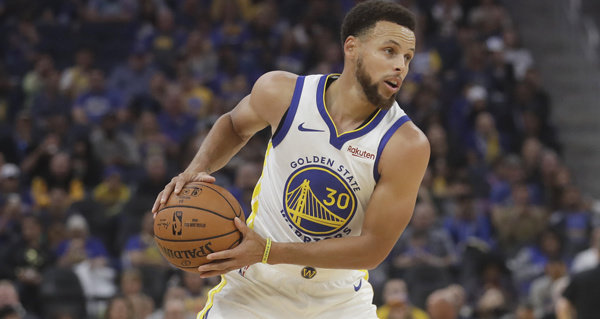Steph Curry is coming back soon, whether this Sunday or shortly thereafter. It’s ironic that Steve Kerr is citing Steph’s lack of scrimmage time as a factor that might keep him out a little bit longer than he had initially planned, because Warriors games are effectively expensive scrimmages at this point. They’re not playing for a postseason spot or even in front of all that many fans. Their short-term goals are relatively modest and abstract: figuring out which current rotation players can contribute in more limited roles next season and getting Andrew Wiggins settled in. Steph’s comeback is part of that second thing. Approximately 20 games of shared court time with Wiggins will serve as a sort of getting-to-know-each-other period. Steph can learn where Wiggins likes the ball delivered on spot-up threes and clock the rhythm and speed with which he cuts to the rim, and Wiggins can witness firsthand what efficient scoring actually looks like.
There’s a possibility that Steph will slightly screw up his team’s draft position, but the Warriors already have the worst record in the league, three games “ahead” of Atlanta in the loss column, and the flattened lottery odds, though not exactly disincentivizing, allow for more variance at the top of the first round. If he wants to play, he should play. The people of San Francisco put good money into pet waste removal apps and driverless golf carts in order to be able to afford Chase Center tickets. They’re entitled to watch Steph pull up from the logo, if he’s willing and able. Any argument that Steph should sit out the rest of the year because the Warriors aren’t competitive is essentially an argument against living. Golden State will likely be title contenders next season regardless of whether they pick first or sixth in the upcoming draft, and if Steph suffers some devastating fluke injury in the coming six weeks—well, we all put our health into the hands of others when we decide to leave the house each morning.
Besides, there is perhaps an unquantifiable benefit to Steph getting himself right at his own pace. Steve Kerr has spoken openly about what a grind the past five seasons have been for himself and his players. The 100-game slate and unrelenting pressure to win a championship wears everybody down. This is functionally a gap year for the Warriors, not dissimilar to what LeBron James had on the Lakers last season after eight straight Finals appearances, and while Steph’s playing schedule is an inverted version of LeBron’s, the crucial thing is that he’s being afforded the opportunity to relax. The stakes are low, the audience is small. It’s a gift, when you’ve been wound tight for so long, to be able to fade into the background for a bit.
Steph entered the league under Don Nelson’s checked out tutelage, on a psychedelically bad Warriors squad that included Monta Ellis and Corey Magette. He knows wide open spaces. In my faulty memory, Steph played several seasons under Nellie, scoring freely and never being asked to get over a screen on defense, but it was actually only a single year. Then it was on to an equally brief Keith Smart interregnum before Mark Jackson’s paranoia seized the franchise. I conflate Steph with Nelson because he is in a lot of ways an embodiment of Nellieball. (Which is a philosophy as much as it is an actual scheme.) He plays more according to feel than instruction and if he has a weakness offensively, it’s that he gives the ball away with silly mistakes that are forgivable because they so clearly come from a place of exuberance. He likes an ill-advised behind-the-back pass every once in a while—or at exactly the wrong moment—which is the sort of thing Kerr tolerates, Jackson rended his tan suits over, and Don Nelson actively encouraged.
Happily or otherwise, Steph Curry is rejoining a familiarly terrible Warriors team. Eric Paschall is just Anthony Tolliver—who was once 24 years old, research confirms—by another name. Kerr is a better coach than late-career Nellie, but it’s hard to see him regulating a rehabbing Steph all that strictly. The guy needs to get some threes up, recalibrate his finishing around the rim, remember when to avoid eye contact with Draymond, etc. This comeback is in some sense a return to the pastoral—farm life being, in reality, unpleasant in many respects. Steph has plenty of room in which to work himself back into shape and it doesn’t matter what the outcomes of that work are, because it’s all rehearsal.
It’s been argued that Michael Jordan’s baseball sabbatical doesn’t represent two forfeited titles. Rather, it was a rejuvenating break from being MICHAEL JORDAN that made the threepeat the Bulls ripped off upon his return possible. We obviously don’t know if that’s the case, but it certainly makes sense given how grumpy and exhausted dynastic teams get toward the end of their league-dominating runs.
This was always going to be a fallback year for the Warriors, given Kevin Durant’s departure and Klay Thompson’s torn ACL. Steph’s broken hand has given him his own siesta. And now he will soon begin something like the basketball equivalent of throwing 60 pitches for a minor league affiliate. There’s no need to rush, no pressure to succeed. If this process isn’t wholly beneficial, it also can’t hurt. He’ll assume a heavy burden again next fall. For now, Steph can regather his strength.



